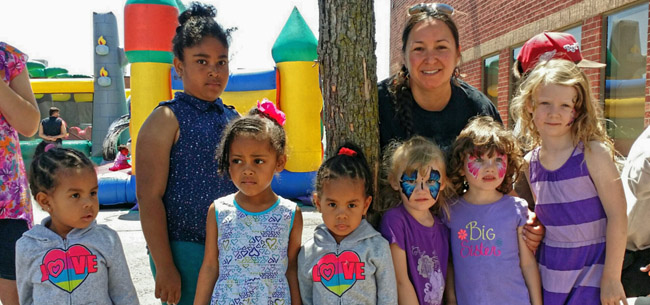‘We deserve a place at the table’: Noakes

By Barb Nahwegahbow
MISSISSAUGA – Kris Noakes doesn’t mince words. A citizen of Nipissing First Nation who’s lived in Mississauga for the last 30 years, she says, “This is our land. This is our country. We deserve a place at the table and we deserve a place in the community that recognizes us for who we are, not for who they think we should be.”
As the volunteer Co-Chair and Co-Executive Director of Peel Aboriginal Network (PAN), she’s determined to make this happen. PAN is a friendship centre and the latest member of the OFIFC.
She’s been equally determined in her own life. When she was fourteen, her family moved from their First Nation to Mississauga where, “I just didn’t fit in,” she said. “I felt like I was on a little island all by myself. There was nobody at school who looked like me.”
She dropped out of school after Grade 10 and hit the road for a few years. She especially liked New Mexico, she said, where she saw brown faces everywhere and, “Boy! Did I ever feel at home!”
She went back to school on her return to Mississauga. When she learned she was going to be a single parent, she got serious about a career. It wasn’t easy. “At one point, I was working three jobs, all part-time. Going to school full-time, working evenings, working weekends,” she said.
Noakes decided on a career in policing because she wanted to contribute to her community. She served as a Municipal By-Law officer before joining Peel Regional Police in 2003. The work’s been rewarding and it’s provided the security she needed as a single parent of two – a 20 year old son and a 5-year old daughter.
It’s her volunteer work with PAN though that’s giving her the opportunity to make a difference in the Peel Aboriginal population which numbers over 12,000 according to the 2011 Census.
“Kris has a huge vision for PAN,” said Sean Carson Kinsella who shares the positions of Chair and Executive Director with Noakes. “Her drive, energy and enthusiasm has taken PAN to where it is now.”
PAN began as a place for Aboriginal people to socialize and do some beading and drumming. It’s evolved into a centre that not only provides cultural programs for all ages, but also social services including legal and housing services, a food bank and counselling. “Our people want to be served by our own people in our own place,” said Noakes, “where they are understood and accepted.”
Noakes’ dreams for PAN include building a centre that’s a destination point for non-Aboriginal people, but more importantly, where Aboriginal people can just be who they are and receive services from their own people, or take part in ceremonies. An alternative school is in the plan.
“We’re the original people here,” Noakes said. “We walk on our land in our country, but we’re the outsiders. We’re invisible.” But not for much longer. Noakes was recently appointed as the First Nations voice to the Mississauga Mayor’s Committee on Diversity and Inclusion.

